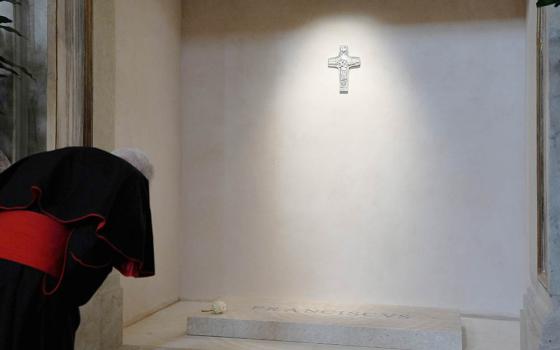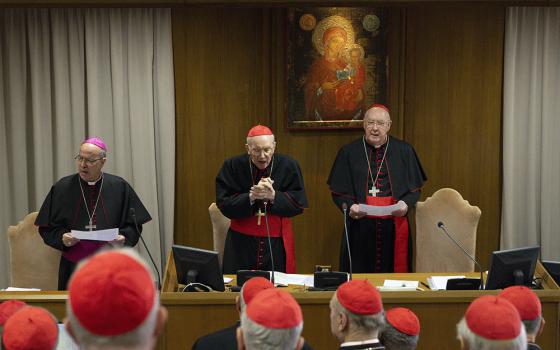Enzo Bianchi, founder and former prior of the ecumenical Monastery of Bose, pictured at the Vatican Jan. 12, 2019. (CNS/Vatican Media)
Enzo Bianchi, founder and former prior of the ecumenical Monastery of Bose, pictured at the Vatican Jan. 12, 2019. (CNS/Vatican Media)
What in the world is going on in Magnano?
This peaceful hamlet in the northern Italian region of Piedmont is home to the Monastery of Bose.
This mixed community of men and women was founded in 1965 by Catholic layman Enzo Bianchi.
Bose soon became a model for ecumenism in action, a place of outreach to non-believers and a spiritual lung for the post-Vatican II era in Italy and beyond.
But for the last many months, it seems to have been walled up in a silence, broken only by occasional press releases that reveal sadness and incomprehension. At issue is the community's relationship with its 78-year-old founder.
At first, everything seemed to be going smoothly.
After 50 years at the head of Bose, Bianchi resigned as prior in 2016. Shortly afterwards, Brother Luciano Manicardi, who has been a member of the community since 1981, was elected to succeed him.Unfortunately, about three years after the transition the community announced that it was undergoing a Vatican-mandated apostolic visitation.It said the objective was to resolve "certain problematic aspects concerning the exercise of authority, governance and the fraternal climate".
"I proposed my successor!"
Then sanctions came in May 2020.
The Vatican said Bianchi must leave Magnano, the place where he lived for more than half a century. It was an order approved by Pope Francis. But up until now, Bianchi has not left.
The pope then intervened directly earlier this month, asking for the "execution" of the decision.
This has still met with no success, despite the fact that the community's other monasteries have emptied its occupants to allow Bianchi to settle there with some brothers and sisters.
The founder argues that the conditions the Vatican has laid down would not respect the "dignity" of those who decide to move with him by denying them the right to lead a "monastic life".
How does one explain such a decision, which some consider quite severe?
Bianchi recently told La Croix that it's hard for him to fathom.
"Consider that I myself proposed my successor! For ten years he was my vice prior, always in agreement and in friendship," the founder said.
But then something changed."
Beginning in November 2018, he showed an unexpected enmity towards me. This remains an enigma for me and for many brothers and sisters," Bianchi confided.
Neither the current leaders of the Bose community nor the pontifical delegate, Father Amedeo Cencini, would speak with La Croix for this article."
I prefer not to intervene publicly," said Cencini, a member of the Conossian Sons of Charity and trained psychotherapist.
The 72-year-old priest defended the Vatican's proposals to Bianchi in a March 16 statement, emphasizing in particular that those who follow the founder will be able to lead "the type of life desired".
Advertisement
"There has not been an easy passage of governance"
"The problem with Enzo Bianchi is that he has never behaved like Benedict XVI, who has repeated since his renunciation: 'There is only one leader and that is Francis'," said Massimo Faggioli, the Italian theological-historian and LCI columnist.
"By his attitude, Bianchi has delegitimized the authority of the prior, which the community elected in accordance with the rule," Faggioli said.
"After the resignation of Enzo Bianchi, there was no easy passage of governance," added Brother Michael Davide Semeraro, a Benedictine monk who knows the community well and has published a book called La Pasqua di Bose (Bose's Easter).
He said the sanctions imposed on the retired founder are not severe, but still "demanding".
Those who have been involved in any way with the Monastery of Bose over the years, are not surprised that Bianchi has some difficulty in passing the torch.
It's no secret that he has an assertive personality, to say the least. But it is also well known that he also allowed considerable freedom to the monks and nuns of the community."
I was never humiliated by him, nor forced, nor abused; I always felt respected," said Riccardo Larini, a former member who left when Bianchi was still prior.
No cases of abuse
So why would Bianchi's mere presence be enough to prevent the 64-year-old Manicardi from calmly exercising his authority?
"There is jealousy, rivalry between the two," said an Italian journalist who knows the situation well."
As is often the case, it's a problem of interpersonal relations," the person said.
The journalist believes the founder indicated to the community his preferred candidate for prior, hoping he could keep some sort of influence over him.
"Manicardi realized that he had been tricked," said another person involved.
But can the current situation be explained as just a conflict between a founder who's been deprived of his authority and a successor who feels his authority has been undermined?
Those who have carefully followed the Bose saga say "yes" without hesitation.
Naturally, some have wondered if there were a more serious issue, such as abuse.
"No one has ever spoken to me about any sort of abuse," insisted Larini, the former Bose monk.
And when the issue has been raised inside the community, current members have reiterated that the problems are related to the founder's character.
"I have never been accused of abuse of authority by anyone!" Bianchi said vehemently
The Bose community is "the principal victim"
Semeraro, the Benedictine monk, said the current difficult situation is not surprising.
"The community is divided, as is always the case when a community is led by the same person for such a long time," he said.
"Enzo Bianchi's profile has not helped matters," the Benedictine added.
Faggioli, who said he " owes a lot personally" to the founder of Bose, argued that is why the Holy See intervened directly.
"Enzo Bianchi has an authority and charisma superior to any Italian bishop. Not even a cardinal was able to demand anything of him," he said.
That's especially true when one considers that Bose's founder has long had the ear of the popes. Most recently Pope Francis appointed him to be an "auditor" at the Synod of Bishops' 2018 assembly on youth.
So, if the affair actually seems to be limited to personal issues, it is not without consequences for the monastery.
"The main victim is the community," Faggioli suggested.
Even before the recent tensions surfaced, about a dozen monks and nuns have left Bose in recent years.
Those who remain are divided. There are those who support Manicardi. Then there are those who support Bianchi. A third group is made up of the undecided.
Many observers fear that the community is on the verge of splitting, as the current standoff seems unresolvable.
Moreover, the Holy See's involvement and the media spotlight could have an unforeseen effect on the future of a community that has evolved with extraordinary freedom up till now.
After this difficult passing of the torch, Bose is now entering a time of "clarification".
Semeraro said this is necessary. But he added that it won't be without pain.
Editor's note: This article originally appeared on La Croix International.





